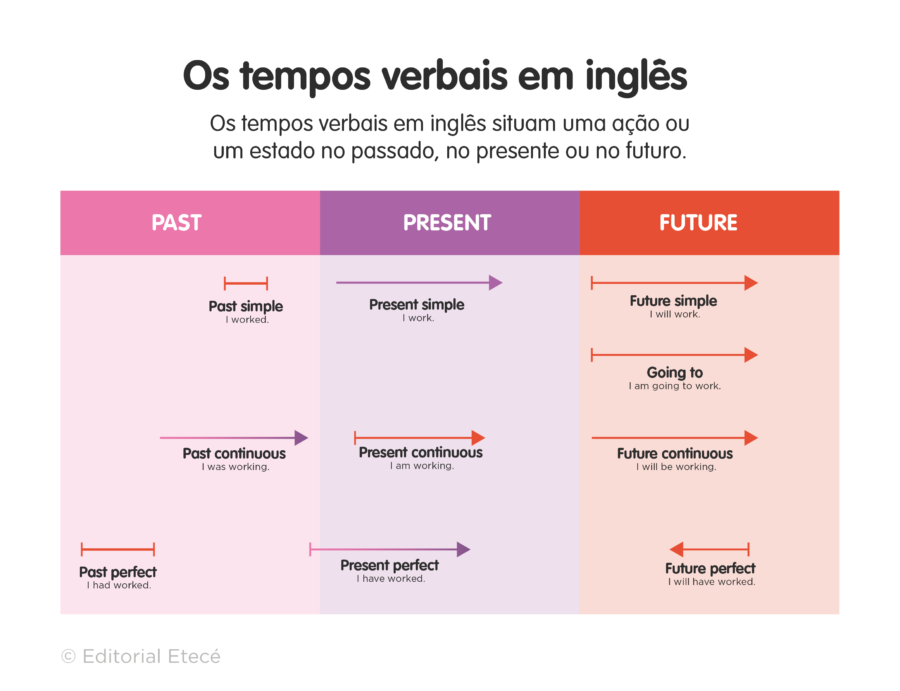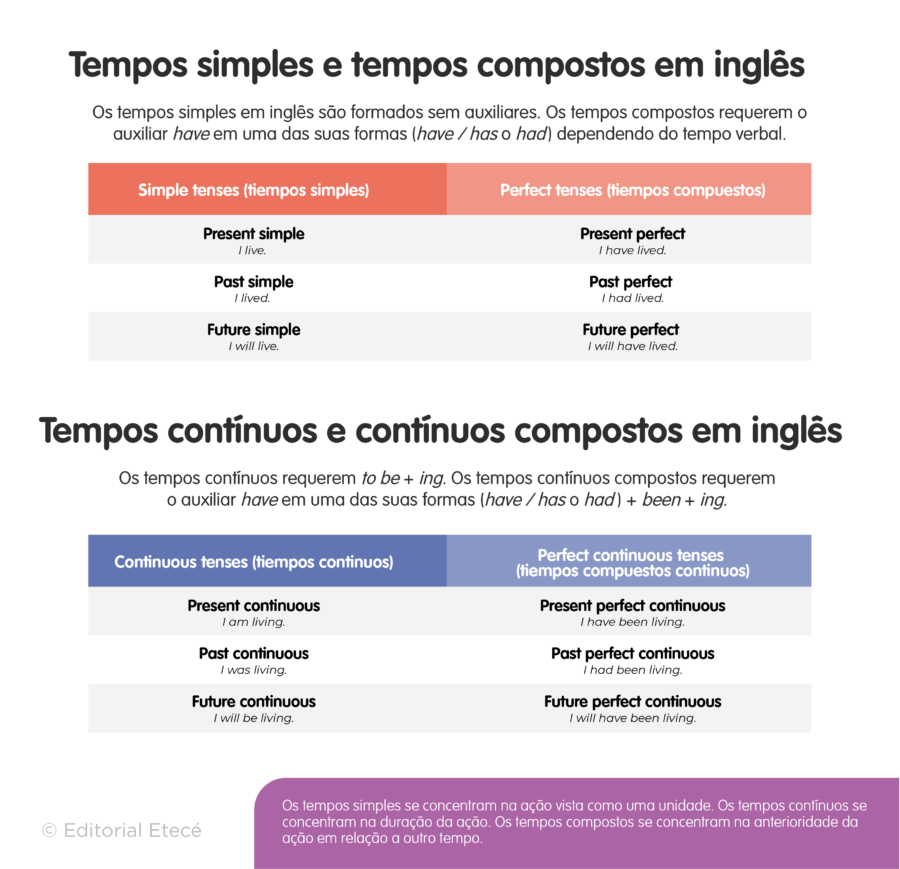Índice
O futuro perfeito em inglês (future perfect) é um tempo verbal composto que se utiliza para expressar ações que terão sido realizadas e finalizadas antes de um momento específico no futuro. Por exemplo: By the year 2026 I will have finished university. / Até 2026 terei terminado a universidade.
As ações expressas no future perfect implica situar-se em um tempo futuro e olhar para trás, para um “passado”, que (a partir do presente) ainda não aconteceu. O futuro perfeito traduz-se como “terei (feito)” ou “vou ter (feito)”. Por exemplo: By the end of the Month I will have moved. / No final do mês, já terei me mudado.
O futuro perfeito é geralmente utilizado em combinação com preposições advérbios que expressam uma data ou hora limite. Por exemplo: By the year 2025 (para o ano 2025), before the end of the month (antes do final do mês), by the time I get home (quando chegar em casa).

- Veja também: «Future simple» em inglês
Estrutura do future perfect
O future perfect é um tempo verbal composto, ou seja, que tem auxiliares para formar a estrutura positiva. Forma-se com will + have (como auxiliar) + past participle.
Estrutura afirmativa
| Sujeito | will have | past participle |
|---|---|---|
| I You He She It We They | will have | done |
Por exemplo: I will have finished this job by Tomorrow. / Terei terminado este trabalho amanhã.
Estrutura negativa
| Sujeito | will not (won’t) have | past participle |
|---|---|---|
| I You He She It We They | won’t have | gone |
Por ejemplo: I will not have finished this job by tomorrow. / Não terei terminado este trabalho amanhã.
Atenção: will not pode contrair em won’t. Por exemplo: I won’t have finished this job by tomorrow.
Estrutura interrogativa
| Will | sujeito | have + past participle |
|---|---|---|
| Will | I you he she it we they | have played? |
Por ejemplo: Will you have finished this job by tomorrow? / Terá terminado este trabalhoamanhã?
Atenção: Existe o future perfect continuous, que é utilizado para enfatizar a duração de uma ação que terá estado em progresso até um momento específico no futuro. Por exemplo: Next year my father will have been working for the same company for 20 years. / No próximo ano, o meu pai terá trabalhado para a mesma empresa durante 20 anos.
Outros tempos futuros
Existem vários tempos verbais que expressam futuro em inglês. A diferença entre eles está relacionada com o contexto e o que o falante quer expressar:
| Tempo verbal futuro | Explicação | Exemplo |
|---|---|---|
| Future simple | Expressa futuro sem outra intenção ou cor. | I’ll sit for the test on August 28. |
| Future continuous | Expressa uma ação em progresso em uma data futura. | I’ll be sitting for the test at 10 a.m. on August 28. |
| Future perfect | Expressa que uma ação terá sido realizada para determinada data futura. | I will have sat for the test by the end of the month. |
Exemplos de orações em future perfect em inglês
- I will have come backby the time you arrive.
Terei voltado quando você chegar. - Alice will have graduated by the time she’s twenty five.
Karen se formará quando tiver 25 anos. - They will have left by tomorrow.
Terão partido amanhã. - The cake will have cooled by the time our friends come over.
O bolo terá esfriado quando nossos amigos chegarem. - The detective will have solved the crime by the end of the episode.
O detetive terá resolvido o crime até o final do episódio. - Will you have finished the book by Monday?
Você terá terminado o livro até segunda-feira? - He will have understood by then.
Ele terá entendido até lá. - In a few years’ time he will have forgotten everything that happened today.
Em alguns anos, ele terá esquecido tudo o que aconteceu hoje.. - This time next year you will have visited every important monument in the city.
Para esta época no próximo ano, terá visitado cada monumento importante da cidade. - With this rain, I will have caught a cold by the time I get home.
Com esta chuva, terei me resfriado quando chegar em casa. - If you come back next Friday, we will have finished the renovation.
Se você voltar na próxima sexta-feira, teremos terminado a restauração. - We will have lived in this house for three years in June.
Em junho, teremos vivido nesta casa durante três anos. - The cold will have kept the vegetables fresh.
O frio terá conservado os vegetais frescos. - The students will have completed all their tests by September 16.
Os alunos terão concluído todos os seus exames até 16 de setembro. - We will have come up with a solution by tomorrow.
Teremos pensado em uma solução para amanhã. - Will you have come back by the time I wake up?
Você terá voltado quando eu acordar? - They will have built the dam by 2030.
Terão construído a barragem até 2030. - Sylvia and Mel will have gotten married by the end of the year.
Sylvia e Mel terão se casado até o final do ano. - The dispute between the company departments will have blown over by the end of the quarter.
A disputa entre os setores da empresa terá sido esquecida até o final do trimestre. - They will have looted the town by the end of the day.
Terão saqueado a cidade até o fim do dia. - I will have explained everything before the teacher gets here.
Terei explicado tudo antes que a professora chegue. - It will have stopped raining by the afternoon.
Terá parado de chover pela tarde. - He will have planned everything before the trip.
Ele terá planejado tudo antes da viagem. - Next week I will have finished the book.
Na próxima semana, terei terminado o livro. - He will have thought of another excuse for the next meeting.
Terá pensado em outra desculpa para a próxima reunião. - Scientists will have discovered a cure for the disease before the next decade.
Os cientistas terão descoberto uma cura para a doença antes da próxima década. - Next time you see him he will have reconsidered his position.
Da próxima vez que você o vire, terá reconsiderado a sua posição. - I will not have forgotten you even in 10 years’ time.
Não terei te esquecido nem daqui a 10 anos. - The jewelry will have been stolen by the time the police arrive.
As joias terão sido roubadas quando chegar a polícia. - We will have made all the necessary arrangements by the end of the week.
Teremos terminado todos os preparativos necessários até o final da semana.
O past participle
O past participle (terceira coluna dos verbos) é uma forma não conjugada que serve para formar os perfect tenses em inglês: o present perfect, o past perfect e o future perfect.
O past participle dos verbos regulares se forma acrescentando a terminação –ed ao infinitivo do verbo.
Por exemplo: like – liked; work – worked; wash – washed.
Los verbos irregulares não seguem regras para formar o past participle:
| Verbo infinitivo | Past participle | Tradução |
|---|---|---|
| be | been | estado |
| become | become | convertido em |
| begin | begun | começado |
| blow | blown | soprado |
| bite | bitten | mordido |
| break | broken | quebrado |
| bring | brought | traído, levado consigo |
| buy | bought | comprado |
| catch | caught | agarrado, tomado |
| choose | chosen | escolhido |
| come | come | vindo |
| cost | cost | custado |
| do | done | feito |
| drink | drunk | bebido |
| drive | driven | dirigida, conduzido |
| eat | eaten | comido |
| find | found | encontrado |
| forbid | forbidden | proibido |
| forget | forgotten | esquecido |
| get | gotten | conseguido |
| give | given | dado |
| go | gone | ido |
| have | had | tido |
| hear | heard | ouvido |
| hit | hit | batido/espancado |
| hurt | hurt | machucado |
| keep | kept | mantido |
| know | knew | sabido, conhecido |
| learn | learnt o learned (regular) | aprendido |
| leave | left | saído, deixado, abandonado |
| lend | lent | emprestado |
| lose | lost | perdido |
| make | made | feito |
| meet | met | reunido, encontrado |
| pay | paid | pago |
| read | read | lido |
| rise | risen | subido |
| run | run | corrido |
| say | said | dito |
| send | sent | enviado |
| sit | sat | sentado |
| steal | stolen | roubado |
| take | taken | tomado |
| understand | understood | entendido |
| wake | woken | acordado |
| wear | worn | vestido, usado |
| win | won | ganhado |
| write | written | escrito |

Continue com:
Esta informação foi útil para você?
Sim NãoGenial! Obrigado por nos visitar :)